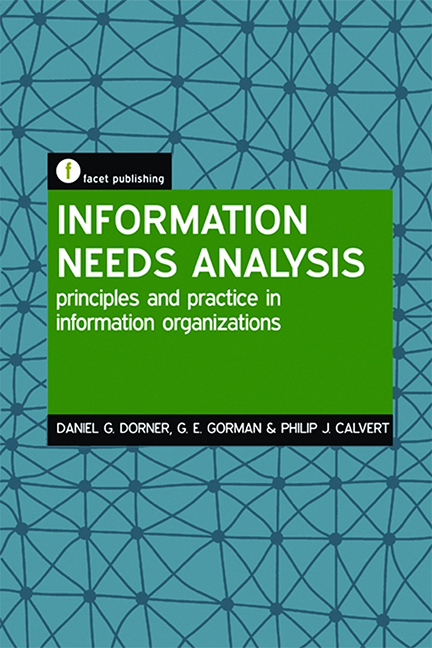Book contents
- Frontmatter
- Contents
- List of figures and tables
- List of scenarios
- About the authors
- Preface
- 1 Background to needs analysis for information managers
- 2 The importance of context in information needs analysis
- 3 Models and types of information needs analysis
- 4 The stages of information needs analysis
- 5 Gathering data for information needs analyses
- 6 Gathering data from existing sources
- 7 Gathering data through surveys
- 8 Gathering data through interviews
- 9 Analysing and integrating information needs analysis data
- 10 Reporting on an information needs analysis
- Bibliography
- Index
2 - The importance of context in information needs analysis
Published online by Cambridge University Press: 10 September 2022
- Frontmatter
- Contents
- List of figures and tables
- List of scenarios
- About the authors
- Preface
- 1 Background to needs analysis for information managers
- 2 The importance of context in information needs analysis
- 3 Models and types of information needs analysis
- 4 The stages of information needs analysis
- 5 Gathering data for information needs analyses
- 6 Gathering data from existing sources
- 7 Gathering data through surveys
- 8 Gathering data through interviews
- 9 Analysing and integrating information needs analysis data
- 10 Reporting on an information needs analysis
- Bibliography
- Index
Summary
Introduction
In Chapter 1 we discussed the meaning of ‘need’ as distinct from ‘want’ and ‘demand’ and used this discussion as a platform for defining INA. However, we did not discuss the essentially contextual nature of those situations in which information needs arise, and therefore the contextual nature of all INAs. This is the purpose of Chapter 2: to place INA in a contextual framework, whether this is a more general cultural context or specific to a particular level (users, providers, resources). The variety of contexts is the overriding theme of this chapter. The second theme is that data do not exist in a vacuum, and on their own they have no intrinsic value – that is, the data of INA are also context-specific.
What does not seem to have been publicly acknowledged is that sometimes the needs and interests of different groups are mutually exclusive. Until we accept this, information managers will struggle to meet these conflicting demands. What is needed is a more realistic vision which provides different things to different people at different times, and perhaps in different venues ….
Roddy, 2005, 41This statement reminds us that different groups have different needs, and these needs are serviced in a variety of ways in varying contexts according to specific local requirements.
For example, there are x entries beginning with the letter ‘J’ in the Manchester telephone directory (available at www.whitepages.co.uk/england/white-pages-manchester. html); that number is a datum, but without any intrinsic value. If, however, we were seeking a list of names and addresses of medical practitioners in Manchester, this would be a different matter. As this book is being written nowhere near Manchester, such data have no value to us; but should we be in Manchester in the near future, then it could well become information that accords with a need at that time, thus becoming of value. The worth, or value, of information and information services depends on context.
No individual or group has an information need per se (Nicholas and Herman, 2009). That is, any community, group or individual has an information need for a specific purpose and within a particular context. Information needs are most likely to be associated with contexts such as the demands of employment, formal or informal study, the need for more efficient operations within an organization, or some social or cultural activity.
- Type
- Chapter
- Information
- Information Needs AnalysisPrinciples and Practice in Information Organizations, pp. 23 - 44Publisher: FacetPrint publication year: 2017



